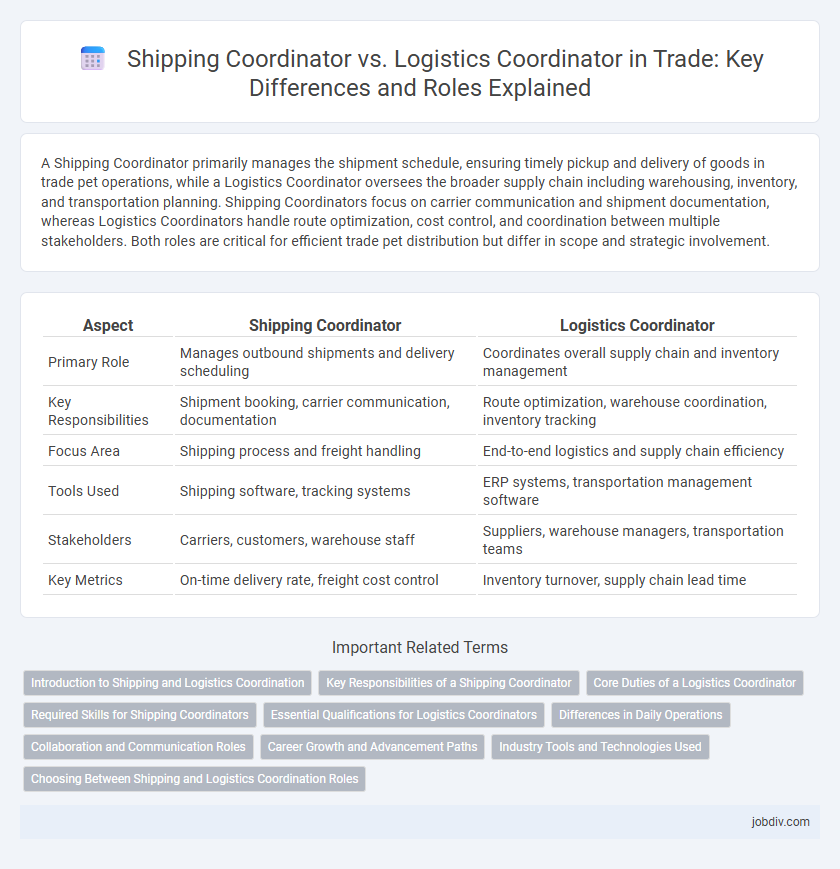A Shipping Coordinator primarily manages the shipment schedule, ensuring timely pickup and delivery of goods in trade pet operations, while a Logistics Coordinator oversees the broader supply chain including warehousing, inventory, and transportation planning. Shipping Coordinators focus on carrier communication and shipment documentation, whereas Logistics Coordinators handle route optimization, cost control, and coordination between multiple stakeholders. Both roles are critical for efficient trade pet distribution but differ in scope and strategic involvement.
Table of Comparison
| Aspect | Shipping Coordinator | Logistics Coordinator |
|---|---|---|
| Primary Role | Manages outbound shipments and delivery scheduling | Coordinates overall supply chain and inventory management |
| Key Responsibilities | Shipment booking, carrier communication, documentation | Route optimization, warehouse coordination, inventory tracking |
| Focus Area | Shipping process and freight handling | End-to-end logistics and supply chain efficiency |
| Tools Used | Shipping software, tracking systems | ERP systems, transportation management software |
| Stakeholders | Carriers, customers, warehouse staff | Suppliers, warehouse managers, transportation teams |
| Key Metrics | On-time delivery rate, freight cost control | Inventory turnover, supply chain lead time |
Introduction to Shipping and Logistics Coordination
Shipping Coordinators manage the scheduling, documentation, and transportation of goods to ensure timely delivery, focusing primarily on outbound shipments and carrier liaison. Logistics Coordinators oversee broader supply chain activities, including inventory management, warehousing, and the coordination of inbound and outbound logistics processes to optimize efficiency. Both roles require strong organizational skills and knowledge of shipping regulations, but Logistics Coordinators maintain a more comprehensive view of the supply chain operations.
Key Responsibilities of a Shipping Coordinator
A Shipping Coordinator manages the scheduling, tracking, and documentation of outgoing shipments to ensure timely delivery and compliance with shipping regulations. Responsibilities include coordinating with carriers, preparing shipping manifests, and resolving shipment discrepancies. This role emphasizes maintaining efficient workflow between warehouses, transport providers, and customers to optimize delivery performance.
Core Duties of a Logistics Coordinator
A Logistics Coordinator primarily manages the entire supply chain process, including inventory control, transportation planning, and warehouse operations, ensuring timely and cost-effective delivery of goods. They coordinate with suppliers, carriers, and internal teams to optimize shipment schedules and track order statuses, minimizing delays and disruptions. Expertise in route optimization, freight documentation, and compliance with shipping regulations is critical for this role to improve operational efficiency and customer satisfaction.
Required Skills for Shipping Coordinators
Shipping Coordinators require strong organizational abilities, attention to detail, and proficiency in shipping software tools such as SAP or Oracle Transportation Management. Effective communication skills are essential to coordinate with carriers, suppliers, and warehouse personnel while ensuring compliance with shipping regulations and customs documentation. Expertise in inventory management and problem-solving enables Shipping Coordinators to handle shipment delays and optimize delivery schedules efficiently.
Essential Qualifications for Logistics Coordinators
Logistics Coordinators require essential qualifications such as expertise in supply chain management, proficiency with inventory control software, and strong organizational skills to optimize distribution processes. Knowledge of transportation regulations, problem-solving abilities, and effective communication are crucial to coordinate shipments efficiently. A background in logistics or business administration and experience with data analysis tools further enhance their capability to manage complex logistics operations.
Differences in Daily Operations
Shipping Coordinators primarily manage the dispatch and delivery schedules, ensuring timely shipment of goods and handling carrier communications. Logistics Coordinators oversee broader supply chain activities, including inventory management, route planning, and coordination between warehouses and transportation services. Daily operations for Shipping Coordinators are more focused on shipment tracking and documentation, while Logistics Coordinators engage in strategic planning and operational efficiency across multiple transportation modes.
Collaboration and Communication Roles
Shipping Coordinators manage shipment schedules, coordinate with carriers, and ensure timely dispatch, focusing on direct communication with freight companies and warehouses. Logistics Coordinators oversee the broader supply chain process, facilitating collaboration between vendors, transporters, and internal departments to optimize delivery and inventory flow. Effective communication between Shipping and Logistics Coordinators enhances operational efficiency, reduces delays, and strengthens supplier and customer relationships in trade operations.
Career Growth and Advancement Paths
Shipping Coordinators primarily manage the timely dispatch and receipt of goods, gaining expertise in carrier negotiation and shipment tracking, which opens pathways to roles like Freight Manager or Distribution Supervisor. Logistics Coordinators oversee broader supply chain operations, including inventory control and route optimization, positioning themselves for advancement into Logistics Manager or Supply Chain Director positions. Both roles offer distinct career growth trajectories, with Logistics Coordinators typically accessing higher-level strategic opportunities through comprehensive supply chain management experience.
Industry Tools and Technologies Used
Shipping Coordinators primarily utilize transportation management systems (TMS) and shipment tracking software such as SAP Transportation Management and Oracle Logistics Cloud to streamline cargo dispatch and delivery schedules. Logistics Coordinators employ broader supply chain management tools like warehouse management systems (WMS) and inventory control platforms, including Manhattan Associates and Blue Yonder, to optimize storage, order fulfillment, and distribution processes. Both roles increasingly integrate IoT devices and real-time analytics software to enhance operational visibility and decision-making efficiency in the trade industry.
Choosing Between Shipping and Logistics Coordination Roles
Choosing between shipping coordinator and logistics coordinator roles depends on the scope of responsibilities and career goals. Shipping coordinators focus primarily on managing shipments, carrier scheduling, and tracking deliveries, ensuring timely and accurate order fulfillment. Logistics coordinators oversee broader supply chain functions such as inventory management, freight coordination, warehousing, and process optimization to enhance operational efficiency.
Shipping Coordinator vs Logistics Coordinator Infographic

 jobdiv.com
jobdiv.com